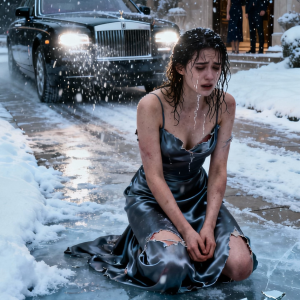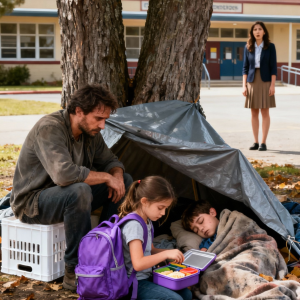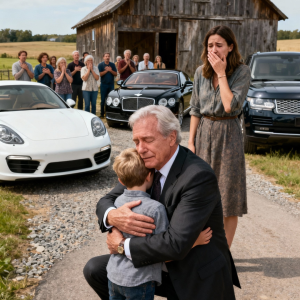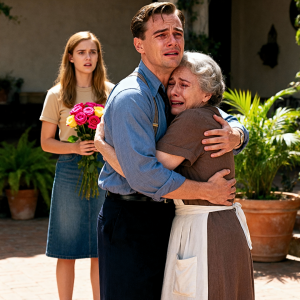
My name is Martin Keller, and when I was thirty-five my wife, Elena, d/ie/d of a sudden aneurysm. Her passing shattered my routine, but it destroyed something far more fragile, the life of her thirteen-year-old son, Daniel.
Daniel wasn’t my biological child. Elena had him before we met, and when I married her I convinced myself I was being generous by “taking them both in.” I even wore that sacrifice like a badge of honor. But in truth, I never embraced him as my own.
When Elena was alive, she was the bridge holding us together. Daniel stayed quiet, polite, and careful—as though he sensed my reluctance. But after the funeral, there was nothing left connecting us.
One rainy evening, a month after she was buried, I shoved his worn duffel bag into his hands and said words I can never erase:
“Go. You’re not mine. I owe you nothing. Find your own way.”
I expected tears or protest. Instead, he lowered his gaze, clutched the bag, and walked away in silence. I didn’t follow. I didn’t even watch where he went.
I sold the house, moved cities, built a business. Years later I remarried a woman with no past, no children. Every so often Daniel’s name surfaced in my mind, not from concern but idle curiosity. Where had he gone? Was he even alive? But eventually even that faded.
Ten years passed.
One morning, I received a phone call from an unknown number.
“Mr. Keller? We’d like to invite you to the opening of the DSR Art Gallery on Westmore Avenue this Saturday. Someone there hopes you’ll attend.”
I was ready to decline when the caller added, “It’s about Daniel.”
The name struck like lightning. I hadn’t heard it spoken aloud in a decade. Against my better judgment, I agreed.
The gallery was sleek, crowded, filled with striking canvases—moody, intricate, unsettling. The placard beside each piece bore three letters: DSR.
Then I heard a voice: “Hello, Mr. Keller.”
I turned. A tall man stood before me, composed, sharply dressed, his eyes unreadable. It took me several seconds to recognize him. Daniel.
I tried to speak, but he interrupted calmly: “I only wanted you to see what I became. And what she left behind.”
He guided me toward a large canvas covered with a cloth. “I call this one Mother,” he said. “I’ve never revealed it before. Tonight, it’s yours to witness.”
He pulled the fabric away.
The painting nearly broke me. Elena lay in a hospital bed, pale and fragile, clutching a small photograph of the three of us during our one family holiday. The detail, the pain in every brushstroke—it forced me to my knees.

Daniel’s voice was steady as steel: “You believed I was someone else’s child. But the truth is… I was always yours.”
I looked up at him, horrified. “What—?”
“She was already pregnant when you met,” he explained. “She told you otherwise because she was afraid you’d marry her only out of duty. Later it became impossible to confess. I found the truth in her journals, hidden in the attic.”
The floor beneath me seemed to vanish. I had driven away my own son.
I tried to reach for him, to apologize, but Daniel’s expression didn’t change.
“I didn’t invite you here for forgiveness,” he said. “I don’t need you to claim me. I only wanted you to know she loved you and she trusted you to choose love freely. You chose the opposite.”
Before leaving, he handed me an envelope. Inside was Elena’s diary. Her words were trembling but clear:
“If you’re reading this, forgive me. I feared you would only stay for the child. But Daniel is ours. From the moment I knew, I longed to tell you. Yet your distance made me hesitate. I prayed you’d love him regardless of truth.”
Tears blurred the page. For the first time in years, I felt the full weight of what I’d done—not just to him, but to her.
In the months that followed, I tried to rebuild something. I waited outside his exhibitions, sent messages he rarely answered. Eventually, he agreed to meet. His voice was gentle, yet firm:
“You don’t have to redeem yourself. I don’t carry hatred. But I don’t need a father anymore. The one I had already decided I wasn’t worth the effort.”

I nodded. He was right. Still, I placed my savings in his name. Not to buy his forgiveness, but to give him what I should have given long ago: support, without condition.
He accepted—not for the money, but because, as he put it, “She believed you were capable of being better.”
Each year, on Elena’s anniversary, I joined him quietly at the small chapel where he lit candles for her. I didn’t call myself his father, but I stood beside him in silence.
At twenty-three, Daniel’s work was selected for an international exhibition. On his artist’s page he wrote one line:
“For you, Mom. I made it.”
And for the first time in a decade, he sent me a message. Just six words that undid me completely: “If you’re free… come, Dad.”




